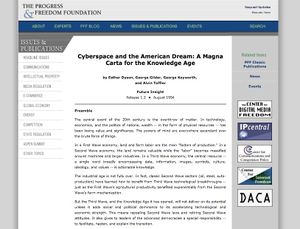Diferencia entre revisiones de «1994 - Cyberspace and the American Dream: A Magna Carta for the Knowledge Age - Esther Dyson, George Gilder, George Keyworth, Alvin Toffler»
(cyberspace and the american dream) |
|||
| Línea 1: | Línea 1: | ||
[[Archivo:Cyberspace an american dream.jpg|miniaturadeimagen|derecha]] | [[Archivo:Cyberspace an american dream.jpg|miniaturadeimagen|derecha]] | ||
| − | |||
| − | Wayback Machine: http://web.archive.org/web/20170102220011/http://www.pff.org/issues-pubs/futureinsights/fi1.2magnacarta.html | + | '''Cyberspace and the American Dream: A Magna Carta for the Knowledge Age |
| + | |||
| + | by Esther Dyson, George Gilder, George Keyworth, and Alvin Toffler | ||
| + | |||
| + | Future Insight Release 1.2 n August 1994 | ||
| + | |||
| + | |||
| + | '''Preamble'''''' | ||
| + | |||
| + | The central event of the 20th century is the overthrow of matter. In technology, economics, and the politics of nations, wealth -- in the form of physical resources -- has been losing value and significance. The powers of mind are everywhere ascendant over the brute force of things. | ||
| + | |||
| + | In a First Wave economy, land and farm labor are the main "factors of production." In a Second Wave economy, the land remains valuable while the "labor" becomes massified around machines and larger industries. In a Third Wave economy, the central resource -- a single word broadly encompassing data, information, images, symbols, culture, ideology, and values -- is actionable knowledge. | ||
| + | |||
| + | The industrial age is not fully over. In fact, classic Second Wave sectors (oil, steel, auto-production) have learned how to benefit from Third Wave technological breakthroughs -- just as the First Wave's agricultural productivity benefited exponentially from the Second Wave's farm-mechanization. | ||
| + | |||
| + | But the Third Wave, and the Knowledge Age it has opened, will not deliver on its potential unless it adds social and political dominance to its accelerating technological and economic strength. This means repealing Second Wave laws and retiring Second Wave attitudes. It also gives to leaders of the advanced democracies a special responsibility -- to facilitate, hasten, and explain the transition. | ||
| + | |||
| + | As humankind explores this new "electronic frontier" of knowledge, it must confront again the most profound questions of how to organize itself for the common good. The meaning of freedom, structures of self-government, definition of property, nature of competition, conditions for cooperation, sense of community and nature of progress will each be redefined for the Knowledge Age -- just as they were redefined for a new age of industry some 250 years ago. | ||
| + | |||
| + | What our 20th-century countrymen came to think of as the "American dream," and what resonant thinkers referred to as "the promise of American life" or "the American Idea," emerged from the turmoil of 19th-century industrialization. Now it's our turn: The knowledge revolution, and the Third Wave of historical change it powers, summon us to renew the dream and enhance the promise. | ||
| + | |||
| + | '''URL:''' http://www.pff.org/issues-pubs/futureinsights/fi1.2magnacarta.html | ||
| + | |||
| + | '''Wayback Machine:''' http://web.archive.org/web/20170102220011/http://www.pff.org/issues-pubs/futureinsights/fi1.2magnacarta.html | ||
[[Categoría:Manifiestos]] | [[Categoría:Manifiestos]] | ||
Revisión del 22:19 30 mar 2017
Cyberspace and the American Dream: A Magna Carta for the Knowledge Age
by Esther Dyson, George Gilder, George Keyworth, and Alvin Toffler
Future Insight Release 1.2 n August 1994
Preamble'
The central event of the 20th century is the overthrow of matter. In technology, economics, and the politics of nations, wealth -- in the form of physical resources -- has been losing value and significance. The powers of mind are everywhere ascendant over the brute force of things.
In a First Wave economy, land and farm labor are the main "factors of production." In a Second Wave economy, the land remains valuable while the "labor" becomes massified around machines and larger industries. In a Third Wave economy, the central resource -- a single word broadly encompassing data, information, images, symbols, culture, ideology, and values -- is actionable knowledge.
The industrial age is not fully over. In fact, classic Second Wave sectors (oil, steel, auto-production) have learned how to benefit from Third Wave technological breakthroughs -- just as the First Wave's agricultural productivity benefited exponentially from the Second Wave's farm-mechanization.
But the Third Wave, and the Knowledge Age it has opened, will not deliver on its potential unless it adds social and political dominance to its accelerating technological and economic strength. This means repealing Second Wave laws and retiring Second Wave attitudes. It also gives to leaders of the advanced democracies a special responsibility -- to facilitate, hasten, and explain the transition.
As humankind explores this new "electronic frontier" of knowledge, it must confront again the most profound questions of how to organize itself for the common good. The meaning of freedom, structures of self-government, definition of property, nature of competition, conditions for cooperation, sense of community and nature of progress will each be redefined for the Knowledge Age -- just as they were redefined for a new age of industry some 250 years ago.
What our 20th-century countrymen came to think of as the "American dream," and what resonant thinkers referred to as "the promise of American life" or "the American Idea," emerged from the turmoil of 19th-century industrialization. Now it's our turn: The knowledge revolution, and the Third Wave of historical change it powers, summon us to renew the dream and enhance the promise.
URL: http://www.pff.org/issues-pubs/futureinsights/fi1.2magnacarta.html
Wayback Machine: http://web.archive.org/web/20170102220011/http://www.pff.org/issues-pubs/futureinsights/fi1.2magnacarta.html
